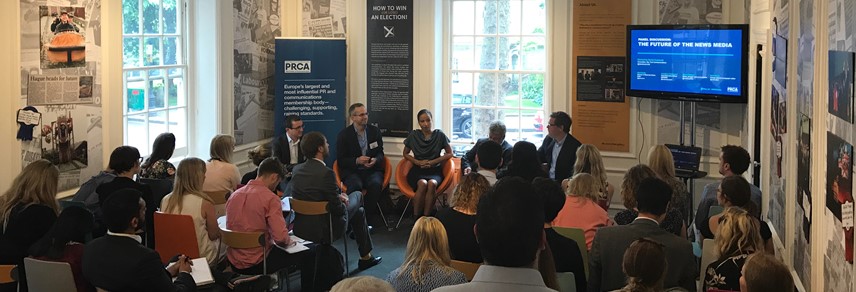
EXAMINING THE FUTURE OF THE MEDIA LANDSCAPE
The PRCA’s recent discussion on the future of the media landscape brought together an esteemed panel of PR and media professionals, yet from regulators to former tabloid editors, the media landscape has witnessed an unprecedented transformation in not only how the public receives its news stories, but how such stories are communicated. The challenges that face media professionals today are evolving, and as the sector battles against obscurity, facing up to them is proving more difficult.
The talk began with former political editor of the Sunday Times, David Cracknell, highlighting the importance of the wider media industry. Cracknell’s opening presentation pointed to the unrelenting domination of digital over print, with newspapers propping up paywalls to combat the shifting trend.
Yet beyond this, Cracknell underscored the fact that the sector still employs approximately 87,500 people, and as changing strategy from content creators manifests itself in bolstered social media output and a higher amount of digital contribution, established newspapers have gained a following of defectors from the recent popularity of alleged ‘fake news.’
Yet trust is one of the defining pillars of a free press, and why it matters to Minna Salami, founder of the blog MsAfropolitan, concerns building the necessary bridges to combat anti-establishment sentiment and wider discernment with regards to the media. Building that framework, for both Jonathan Heawood, CEO of independent press regulator, IMPRESS, and Niall Duffy, director of external affairs at IPSO, involves a new approach to communicating the key tenets of a desirable media landscape. They affirm that 'fake news' has always existed under different guises.
Striking a fine balance between regulators and editors then, is a task Neil Wallis, former tabloid news editor, considers imperative. As regulation attempts to turn on the metaphorical seatbelt sign to ease the turbulence of the press, it must avoid an antediluvian approach and keep in time with the pace of the modern news cycle. Yet as today’s ultra-fast news cycle values being first over being right, selling stories is another challenge facing today’s media landscape, and one that modern PRs are continuing to combat.
Chris Lee, media and content director at Mash PR, was also a keynote speaker at the PRCA discussion. Following up on the discussion for the London business newspaper, City A.M., Lee says, “I believe PRs need to draw on their skills in crisis communications, messaging and social media in an era of fake news. And they need to prepare now. The time to repair the roof is when the sun is shining, to quote John F. Kennedy.”
For professional communicators and PR professionals alike, an amplified responsibility to remodel the field has never been more topical. The recent election perhaps proves itself as the most apt example of how important the future of the media landscape is, and how quickly it can be subject to rapid transformation.

